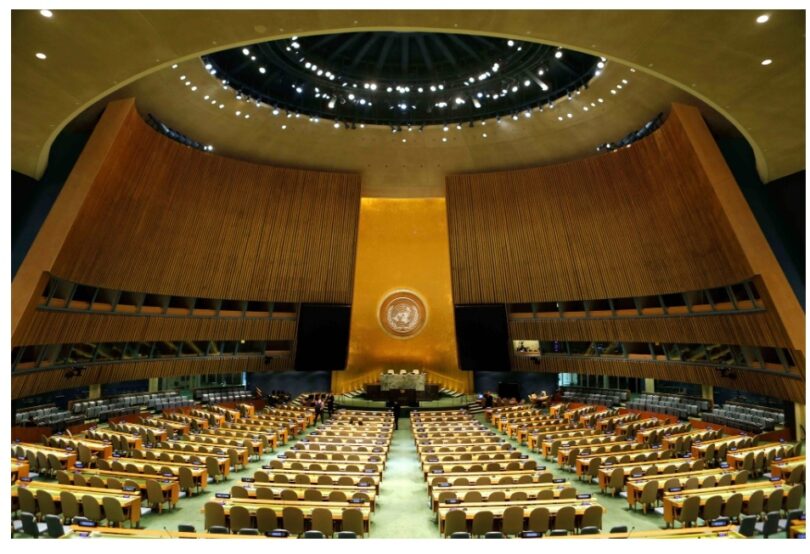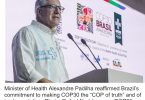The 62nd session of the Commission for Social Development (CSocD62) will centre on accelerating progress toward the 2030 Agenda for Sustainable Development and poverty eradication through social policies. Scheduled from 5 to 14 February 2024, CSocD62 convened at the United Nations Headquarters in New York, and the first week has been impactful.
Day 1
The opening meeting of the 62nd session of the United Nations Commission for Social Development commenced with a fervent call to action as the Chairperson welcomed esteemed attendees, including the President of the General Assembly, the Vice President of the Economic and Social Council, and other distinguished delegates. Setting the tone for the deliberations ahead, the Chairperson expressed profound gratitude for the unwavering commitment to Social Development, emphasizing its pivotal role in realizing the 2030 agenda for sustainable development.
The session’s priority theme, “Fostering Social Development and Social Justice Through Social Policies,” was aptly framed within these pressing global challenges. The Chairperson articulated the session’s agenda, which included high-level panel discussions, ministerial forums, and multi-stakeholder forums. Topics of focus encompassed key issues such as the impact of digital transformation on inclusive growth and development, highlighting the need for integrated social, economic, and environmental policies.
Crucially, the Chairperson emphasized the timeliness of the session and the indispensable role of member states, civil society organizations, and the United Nations system in driving progress towards poverty eradication and Social Development. With confidence in the collective commitment of stakeholders, the Chairperson envisioned a future marked by inclusivity, justice, and sustainability.
Following the Chairperson’s address, His Excellency Dennis Francis, the President of the General Assembly, echoed the urgency of addressing poverty and advocated for transformative actions at all levels. Similarly, the Vice President of the Economic and Social Council emphasized the imperative of sustainable, resilient, and innovative solutions in the pursuit of poverty eradication.

The Under-Secretary-General for Economic and Social Affairs drew attention to the widening gap between developed and developing economies, calling for systemic shifts towards inclusivity and resilience. Additionally, the NGO Committee on Social Development Chair underscored the need for a renewed social contract integrating social, economic, and environmental justice.
In a powerful pre-recorded video message, a youth advocate from the Global Youth Health Caucus of Zambia shed light on the digital divide’s profound impact on underserved youth, advocating for inclusive development policies to address existing disparities.
Representatives from various nations contributed their perspectives on social development and inclusion. Romania highlighted its commitment to education reform and social welfare through initiatives like the “Educated Romania” program. The United Arab Emirates emphasized holistic social policies prioritising mental and physical well-being, equality, and inclusion. Botswana shared its strategy for poverty eradication, focusing on social protection programs and inclusive policies. Guyana underscored the importance of inclusive development policies centred on education, gender equality, and support for marginalized groups.
Day 2
The event’s second day commenced with a resounding call for continued commitment to fostering social development and social justice through inclusive social policies. Highlighting the crucial role of such policies in addressing inequalities and promoting human development, the discussions delved into key strategies and initiatives aimed at accelerating progress on the implementation of the 2030 Agenda for Sustainable Development.
Her Excellency Valerie Bedberer, Head of International Labor Affairs at the State Secretariat for Economic Affairs of Switzerland, underscored the importance of productivity and robust economic conditions in driving social progress. Bedberer emphasized Switzerland’s efforts to create conducive environments for both family life and professional pursuits, including measures to facilitate flexible employment and lifelong learning opportunities.
Echoing similar sentiments, Madame Elen Lio, Director of Development Cooperation Policy at Hellenic Aid of the Ministry of Foreign Affairs of Greece, emphasized Greece’s dedication to investing in education, healthcare, and gender equality. She highlighted the pivotal role of quality education and healthcare in breaking the cycle of poverty and empowering individuals while also shedding light on Greece’s initiatives to promote gender equality domestically and internationally.
Miss Gloria Reay, the General Director of the Superate program at the Presidency of the Dominican Republic, shared valuable insights into her nation’s endeavours in advancing social development. Reay stressed the significance of targeted policies and programs to empower marginalised communities and foster social inclusion. She reiterated the Dominican Republic’s commitment to addressing structural barriers and fostering international dialogue and cooperation.
Overall, the event’s second day provided a platform for insightful discussions and fruitful exchanges, reaffirming the collective commitment to advancing social development and social justice globally.
Day 3
The third day of the 62nd Commission for Social Development session continued its discussions on agenda item 3A, focusing on the priority theme: “Fostering Social Development and Social Justice Through Social Policies to Accelerate Progress on the Implementation of the 2030 Agenda for Sustainable Development.” The session aimed to address the overarching goal of poverty eradication and promote multilateral cooperation in achieving sustainable development objectives.
The Ministerial Forum on the priority theme kicked off the session, featuring distinguished panellists from Austria, Brazil, Portugal, Uganda, and Costa Rica. Despite logistical challenges, the forum provided valuable insights and perspectives on tackling social challenges and advancing social justice through policy initiatives.
- Austrian Perspective: Minister Johannes Ra highlighted the impact of recent crises on global social challenges, emphasizing the importance of investing in social services and Austria’s proactive measures to address inflation and support vulnerable populations.
- Brazilian Perspective (via pre-recorded video): Minister Wellington Diaz stressed Brazil’s commitment to combating hunger, poverty, and inequality, advocating for international cooperation and practical mechanisms to mobilize resources.
- Portuguese Perspective: Minister Ana Mendes Ginho emphasized the critical role of social investment in promoting economic prosperity and social cohesion, outlining Portugal’s initiatives to invest in children, support workers’ rights, and

- Ugandan Perspective: Minister Betty Among highlighted Uganda’s commitment to inclusive development and social protection, showcasing achievements in reducing poverty and promoting gender equality through affirmative action policies and strategic investments.
Following the Ministerial Forum, delegates engaged in a robust discussion on promoting economic equality and eradicating poverty, highlighting the importance of comprehensive social policies and international cooperation in achieving the Sustainable Development Goals (SDGs).
- Uganda’s Commitment to Sustainable Development: Uganda reiterated its commitment to the SDGs, integrating them into national planning frameworks and implementing various social programs to address poverty and promote inclusive development.
- Costa Rica’s Multidimensional Approach: Representatives from Costa Rica emphasized the importance of multilateralism and innovative state action, highlighting integrating social considerations into development frameworks and using data and digital technology to address inequalities.
- Cyprus’ Efforts in Social Welfare: Cyprus showcased its commitment to mainstreaming social considerations into development frameworks implementing reforms to enhance the efficiency and effectiveness of social interventions.
- Austria’s Approach to Social Development: Austria emphasized investments in early childhood interventions and social assistance programs to break the intergenerational cycle of poverty.
The interactive dialogue concluded with reflections from panellists, emphasizing the importance of concrete social actions, international cooperation, and sustainable development strategies. Ministers highlighted efforts in domestic resource mobilization, education, poverty eradication, and global economic strategies to support national social policies in developing countries.
Day 4
The 4th day of the 62nd Commission for Social Development session convened with a notable focus on commemorating the 30th anniversary of the International Year of the Family. Among the various discussions, a high-level panel gathered to dissect the intricate interplay between urbanization, migration, and climate change on family structures and societal resilience.
Assistant Secretary-General for Policy Coordination and Inter-agency Affairs of the United Nations Department of Economic and Social Affairs, Maria Franchesca Spano, set the stage, emphasizing families’ pivotal role as the frontline responders amidst the complexities of our contemporary world. She drew attention to the far-reaching impacts of mega-trends such as rapid technological advancements, urbanization, demographic shifts, and climate change, urging for comprehensive, family-centric policies to confront these challenges head-on.
Professor Bahira Tras from the University of Delaware talked about the transformative nature of urbanization and its close relationship with migration patterns. She stressed the importance of tailoring interventions to local contexts and addressing the unique needs of migrating populations, particularly vulnerable groups like women and individuals with disabilities.
Professor Zita Moman, leading the Department of Sociology at the University of Ptor, further illuminated the gendered dimensions of urbanization and migration. She highlighted the heightened vulnerabilities faced by women and girls in urban settings. She underscored the imperative of gender-sensitive policies and inclusive urban planning initiatives to safeguard their well-being.
Professor Tras talked about the increasing displacement of populations due to extreme weather events and environmental degradation, emphasizing the urgent need for coordinated responses to support affected families. She advocated for the integration of a life course perspective into climate adaptation strategies, particularly for vulnerable populations such as older persons and individuals with disabilities.
As the discussion concluded, moderator John Wilmouth, Officer in Charge of the Division for Inclusive Social Development at the United Nations Department for Economic and Social Affairs, reiterated the importance of integrating family-oriented perspectives into global development agendas. He emphasized the need for multi-stakeholder collaboration and policy coherence to address the complex interplay of urbanization, migration, and climate change on family dynamics and societal well-being.
Day 5
The fifth day of the event commenced with a focus on emerging issues surrounding the influence of digital transformation on inclusive growth and development. Under agenda item 3C, titled “Emerging Issues: The Influence of Digital Transformation on Inclusive Growth and Development: A Path to Realizing Social Justice,” distinguished panellists convened to delve into the multifaceted dimensions of this critical topic.
The event, chaired by an esteemed representative, initiated with a warm welcome extended to the panellists, including His Excellency Gabriel Bastos, Secretary of State for Social Security of the Ministry of Labor, Solidarity, and Social Security of Portugal; Miss Heah Hagras, Special Rapporteur on the Rights of Persons with Disabilities; Miss Ursula Fin Hoven, Head of the International Telecommunications Union (ITU) Liaison Office to the United Nations in New York; Miss Aida Opuku-Mensah, Managing Director of Centric Digital G; and Miss Julia Stanovic, Associate Professor in the Department of Computer Science and Engineering and Director of the Center for Responsible AI at New York University. The moderator, Miss Cynthia Samuel, Special Representative to the United Nations and Director of the International Labour Organization (ILO) Office in New York, skillfully steered the discussion.
As the panellists commenced their presentations, they provided illuminating insights into various facets of digital transformation and its impact on inclusive growth and social justice. His Excellency Gabriel Bastos underscored Portugal’s innovative approaches to leveraging technology to enhance social security services, citing concrete examples such as the automatic child benefit allocation mechanism and the pension on time program. These initiatives not only streamlined processes but also democratized access to social protection, thereby fostering inclusion and equity.
Miss Ursula Fin Hoven, representing the ITU (International Telecommunications Union), elaborated on the necessity of meaningful connectivity for sustainable digital transformation. She emphasized that universal access to digital infrastructure and services is fundamental to realizing the benefits of the digital economy. Miss Fin Hoven underscored the need for collaborative efforts to address existing disparities in connectivity and promote digital inclusivity, thereby fostering socioeconomic development.

Throughout the panel discussions, key themes such as the importance of policy interventions, the role of digital technologies in promoting inclusion, and the need for international cooperation resonated strongly. The panellists stressed ensuring that principles of equity, human rights, and social justice guide digital transformation.
One of the conference’s central themes was the intersection of digital technology with various facets of society, including medicine, education, and social assistance. Madame Pookum Mena emphasized the transformative potential of digital integration in healthcare while underscoring the challenges associated with AI’s propensity for errors and its implications in different contexts.
His Excellency Yavu Sim Kiran, the Deputy Minister of Family and Social Services of Turkey, showcased Turkey’s Integrated Social Assistance Information System as a beacon of excellence in social policy information systems. As represented by its youth delegate, Switzerland raised concerns about the adverse impacts of digitalization on mental health, emphasizing the need for universal access to digital tools, especially for education. Poland echoed the importance of digital accessibility, emphasizing the need to address digital exclusion, particularly among persons with disabilities and older individuals. The Islamic Republic of Iran posed questions to Madame Mena regarding the connection between digital rights and freedom of expression and the potential of partnerships like the New Partnership for Africa’s Development (NEPAD) in achieving tangible social justice outcomes.
Cuba underscored the importance of international cooperation in digital transformation, particularly in bridging the digital divide between developed and developing countries. Mexico emphasized the need for responsible development and ethical use of digital technologies, citing initiatives like the Global Alliance for AI and promoting human rights in the digital context.
The Global Fund for Widows highlighted the gendered impact of digital exclusion, particularly on widows, advocating for equitable gender policies and digital literacy programs to address socioeconomic disparities.
The Institute for Plenary Synthesis proposed a three-pronged plan for steering digitalization towards economic and social justice, focusing on inclusive digital economies and sustainable development.
The event takes the weekend break after 5 days filled with intelligent discussions and a vibrant following. The expectation is that there will be more of the same and more when the event continues the 12th of February 2024.








